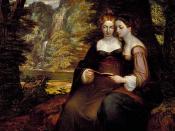It is odd to see that love can be so versatile. There are people who claim they are in love and get divorced a week later, and others who are "in love" stay married for over fifty years. In Midsummer Night's Dream, Shakespeare's portrayal of order versus chaos demonstrates his belief that love is a blinding force blocking everything that may even hinder its path, therefore creating much conflict if a rational mindset does not take place. Although innocent love may thrill young lovers, Shakespeare derides this idea to show that in the end, mature love will always prevail. When trials and tribulation are to occur, mature love lasts, while innocent love fails to pull out in the end. He believes although that all is fair in love and war, but in the end, that lasting will be the true and unconditional love.
It is human nature for people to fight due to their different opinions.
In the Lover's quarrel, Act III Scene II, Hermia and Helena try to solve out their differences through harking at each other while Lysander and Demetrius try to win Helena over at the same time. Instead of trying to figure things out calmly like mature adults, Hermia emotionally quotes, "But why unkindly didst thou leave me so?" (Line 187). Showing her hurt and confusion, her anger began to boil which lead her soon to be in denial. Hermia is trying to understand all this sudden change in Lysander's behavior and becomes jealous of Helena, receiving all of the boy's attention. If Hermia loved Lysander, however, wouldn't she want what he wanted? It seems as if this should be so, however she takes out her anger on Helena, shown when she harks, "O me! You juggler, you canker blossom, you thief of love! (Lines 296-297)".


